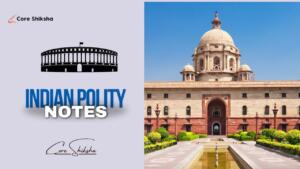Indian polity notes for UPSC Indian polity is one of the most important subjects for competitive exams such as UPSC, SSC, etc. It helps in understanding the system of governance in India, from the law to the institutions. Indian polity is not only relevant for exams, but it also helps in understanding the rights and responsibilities of a citizen. In order to ace the exams and be an informed citizen, it is essential to study the Indian polity notes. It is also very important for civil servant aspirants to spend enough time studying the Indian polity and understanding it thoroughly. The Indian polity and Constitution is very important for both the preliminaries and mains examinations.
In this article, you will get all the Indian Polity Notes For any Competitive exam and highly recommend reading the notes for UPSC carefully as it helps in connecting different ideas.
Topic – Wise Indian Polity Notes
| Parts in Indian Polity | Topic |
| Indian Constitution | Acts and Regulations under the Crown Rule in India |
| Indian Constitution – Features | |
| Basic Structure Doctrine | |
| Doctrine of Checks and Balances | |
| Process of Law Making | |
| Secularism in India | |
| Indian Constitutional Amendments | |
| Union Territories | |
| Constitutional Assembly- Making of Indian Constitution | |
| Fundamental Duties | |
| Constitutional Morality | |
| Types of Majorities | |
| Organs of State | Collegium Systems and Appointments |
| Judicial Reforms | |
| Cooperative Federalism | |
| Inter-State Relations | |
| Federalism in Indian Polity | |
| Asymmetric Federalism | |
| Competitive Federalism | |
| Judicial Activism and Overreach | |
| Centre-State Relations | |
| Separation of Power | |
| Judicial Pendency | |
| Devolution of Power and Finances | |
| Indian Parliament | Role of Speaker |
| Lok Sabha and Rajya Sabha | |
| Comparison between India-UK Constitution | |
| Council of Ministers | |
| Cabinet and Cabinet Committees | |
| President of India | |
| Vice-President of India | |
| Powers of the President | |
| Prime Minister of India | |
| Attorney General of India | |
| Emergency in India | |
| Parliamentary Privileges | |
| Comptroller and Auditor General | |
| Parliamentary Committees | |
| PIL (Public Interest Litigation) | |
| Office of Profit | |
| National Emergency in India | |
| Money Bill | |
| Structure of the Indian Parliament | |
| India Elections | Electoral Reforms in India |
| Electoral Funding | |
| Model Code of Conduct | |
| Voting in India | |
| Local Self Government | Pesa Act 1996 |
| Local Self Government in India | |
| Urban Local Bodies | |
| Panchayati Raj Institutions | |
Constitutional and Statutory Bodies | National Commission of Women |
| Central Information Commission | |
| Central Vigilance Commission | |
| National Commission for Minorities | |
| National Council for Transgender Persons | |
| National Human Rights Commission | |
| State Human Rights Commission | |
| National Commission for Protection of Child Rights | |
| Policies and Acts | Pressure Groups |
| Tribunals in India | |
| Administrative Tribunals | |
| Right to Education Act | |
| Representation of People Acts 1950 | |
| Lokpal and Lokayukta Act | |
| Anti-Defection Law | |
| Indian Constitution Schedules | Schedules of the Indian Constitution |
| 5th Schedule of the Indian Constitution | |
| 6th Schedule of the Indian Constitution | |
| 8th Schedule and the Official Language | |
| 9th Schedule of the Indian Constitution |
How to make notes for Indian Polity?
To make notes for Indian Polity you should consider some points given below:
- Try to Keep it simple like you are making notes on every important topic.
- Break complex ideas down into easy-to-understand bullet points.
- Highlight important changes and landmark decisions.
- Include current events for relevance. Federalism and separation of powers are emphasised.
- Break down each topic into short sentences or keywords.
- Revise and update notes regularly for accuracy.
- Focus on understanding rather than memorization.
Conclusion
In conclusion, UPSC Indian polity notes help you understand the depth of India’s governance system. Indian polity notes provide you with a well-structured understanding of constitutional rules, administrative structures, and political processes that are essential for UPSC examination success. In addition, they help you understand fundamental rights, responsibilities, and governmental mechanisms so that you can analyze and interpret complicated issues effectively. By summarizing key concepts and providing case studies, UPSC India polity notes give you the knowledge and skills you need to excel in the examination.

